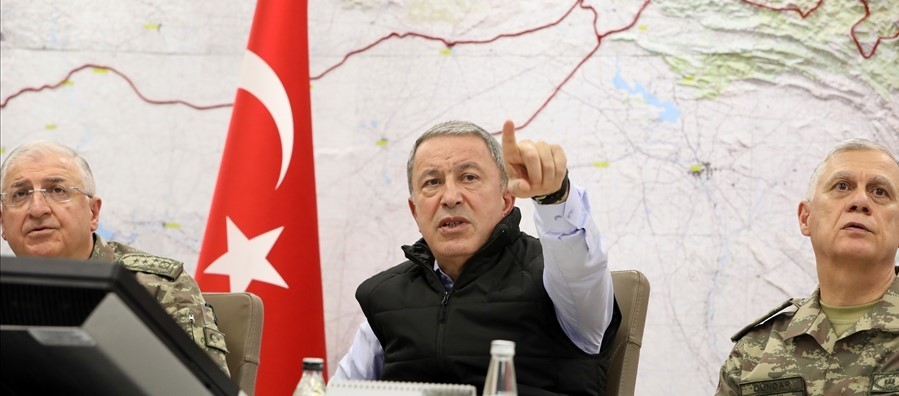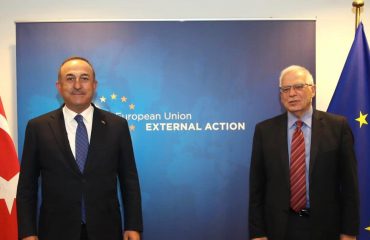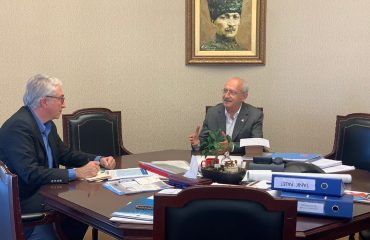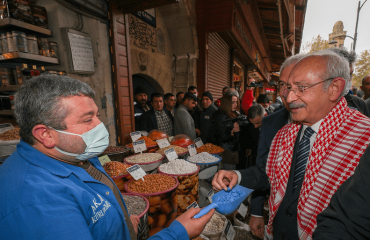
The third Turkish military campaign into Syria in the last three years was launched as of 16:00 Turkish time (14.00 GMT), on October 9, as announced by President Tayyip Erdoğan on his Twitter account.
The operation coded as “Peace Spring” has started with Turkish F-16s taking off from the Diyarbakır airbase hitting their targets near the towns of Tel Abiad and Rasulayn in Syria, by the Turkish border. Extraordinary activity in the İncirlik base near Adana was also reported. Simultaneously, 45 km range Fırtına (Storm) howitzers took position near the towns of Akçakale and Ceylanpınar on the Turkish side and began to shell the same targets. In a statement, in the early evening hours, the Turkish Defense Ministry stated that “only terrorists and their fortifications, trenches, positions, weapons, vehicles and equipment” were being targeted, and not civilians or civilian buildings.
The ministry announced as of 22:30 that the troopers have started to cross the border into Syria as well.
Military analysis
The main target of the operation is to push the armed groups affiliated with the outlawed Kurdistan Workers’ Party (PKK) away from the Turkish-Syrian border with a total length of 910 km. The PKK’s Syria branch called the Democratic Union Party (PYD), and its militia force, the People’s Protection Units (YPG) –under the name of Syria Democratic Forces (SDF) – have been collaborating with the U.S. Central Command (CENTCOM). They have been serving as mercenary ground troops in the fight against the Islamic State of Iraq and Syria (ISIS) since 2014 despite Turkey’s objections.
Turkey also wants to have a “Safe Zone”, a strip between the rivers Euphrates and Tigris with roughly 30 km deep (or 20 miles as the U.S. President Donald Trump has pronounced earlier). Turkey also wants to build towns and villages for nearly 2 million of the nearly 3.6 million Syrian refugees who currently live in Turkey.
The 120 km-long-strip between Tel Abiad-Akçakale and Rasulayn-Ceylanpınar seems to be the main bridgehead for the Turkish campaign. There are mainly Arab-populated towns and villages in that region, which might mean less resistance onsite by the YPG. If the Turkish military and the newly re-branded Syria National Army (SNA) manage to hold the area it is most likely that the forces will spread to the West towards the YPG/PKK stronghold Kobane (Ayn al-Arab) and to the South to take parts of the M4 highway under control in order to severe the PKK’s logistical links in Syria and its headquarters in Iraq’s Kandil Mountains by the Iranian border. The Turkish Air Force has been bombing the PKK’s positions in Iraq near the Turkish and Syrian borders for months, as preemptive strikes meant to destroy the passage points on the ground.
The PKK positions in Manbij and Tel Rifat in West of the river Euphrates are likely targets in the operation. The clashes might be fatal since the U.S. army has been providing arms and training for tens of thousands of YPG/PKK militants for the last 5 years in Syria.
Diplomatic analysis
Turkey seems diplomatically isolated in the “Peace Spring” operation when the official statements are considered.
Several countries, from Syria to Germany and Saudi Arabia to Sweden, have condemned the operation. Head of the EU Commission, Jean-Claude Juncker has asked Turkey to stop it. Trump said that the U.S. was not supporting the Turkish operation and that he had told Erdoğan during their telephone talk on October 6 that the military campaign would be a bad idea. The U.S. Congress has threatened Turkey with “sanctions from hell” if Turkey entered Syria and actually started to take steps in that direction.
On the other hand, it was Trump who gave hidden support for the Turkish operation by saying that the U.S. would not get involved and withdrew his symbolic presence troops from the border areas. There is no time limit announced for the operation but the November 13 meeting in Washington DC announced by Trump with Erdoğan might be a threshold. Russian Foreign Minister Sergey Lavrov said Moscow did not approve the incursion but understood Turkey’s legitimate security concerns as long as Syria’s territorial integrity and sovereignty rights were respected. NATO Secretary-General Jens Stoltenberg also said that Turkey had known security concerns but should act proportionately.
Turkish Defense Ministry said in writing that the operation was “being conducted by respecting the territorial integrity of Syria and in the framework of the “Right of Self Defence” in Article 51 of the UN Charter”. Foreign Minister Mevlüt Çavuşoğlu said that Damascus was informed about the campaign with a diplomatic note, talking to a number of his colleagues including Mike Pompeo for the U.S. Ambassadors of the permanent members of the U.N. Security Council which is set to have an emergency meeting on the matter on October 10 were briefed about the operation in the foreign ministry.
Turkey is likely to have difficulties in the diplomacy field as well as on the ground.
Political analysis
All major political parties except the Kurdish problem-focused Peoples’ Democratic Party (HDP), the third biggest in the Turkish parliament have voted for permitting Erdoğan’s Justice and Development Party (AKP) government to send troops abroad on October 8. Kemal Kılıçdaroğlu of the center-left main opposition Republican People’s Party (CHP) said he was against the war but took the hard decision because fighting terrorism means self-defense for Turkey, also insisting that the operation should be conducted in cooperation with Bashar al-Assad’s government.
As soon as the operation was launched Erdoğan called up all party leaders other than the HDP and briefed about the campaign.
It seems Erdoğan will not have much difficulty in the domestic scene, especially if the operation will end soon and with as fewer causalities as possible.
Symbolism analysis
The operation was launched on the 21st anniversary of the expulsion of Abdullah Öcalan, the founding leader of the PKK from his headquarters in Damascus in 1998, following Turkey’s threatening (father) Hafez al-Assad with war. Öcalan was captured on February 1999 as he was forced out of the Greek Embassy in Kenya, where he was hiding as a result of a joint operation of the U.S. and Turkish intelligence services CIA and MIT.
The name Peace Spring has linguistic links with the original name of the town Kobane, which is Ayn al-Arab, meaning the Arap Spring. The Turkish-American ties got severed over the siege of the YPG held town by ISIS in 2014 when former U.S. President Barack Obama ignored his NATO ally Erdoğan’s objections and opted to cooperate with the YPG against ISIS.
Crocodile tears for “Kurds” or the “PKK”?
Not only Trump but a number of Western politicians expressed concern about the Turkish attacks “Kurds” as the “savior” of Christians from the hands of ISIS, without making any distinction about millions of Kurds living in Turkey, Iran, Iraq and Syria having diverse political views and the PKK. Trump went as far as threatening to “devastate” the Turkish economy if “Turks” attempted to erase “Kurds”.
But there was no American reply when the SDF has asked for the closure of Syrian air space by the Americans to stop Turkish air raids; Trump said the U.S. would stay out of it. It will not be the first example if armed Kurdish movements would be abandoned after being used by the Americans against opponents in the Middle East, since the end of the WWII.


